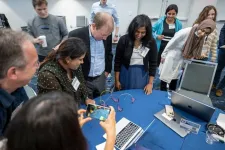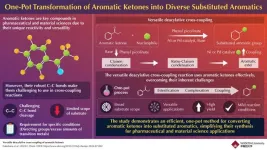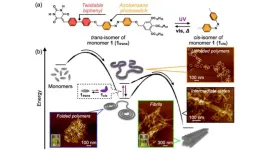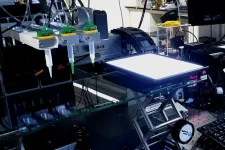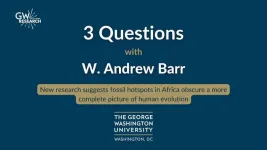(Press-News.org) UTSA will partner with Texas A&M University to co-lead SECURE Southwest, one of five new regional centers being launched to strengthen U.S. research security.
Under a five-year, $67 million award from the National Science Foundation (NSF), the Safeguarding the Entire Community of the U.S. Research Ecosystem (SECURE) Center aims to strengthen intellectual property and research security by educating members of the research community about security issues and engaging them in a process of collaborative problem-solving.
The center will take a novel, community-based approach to protecting national research, bringing key players together under one virtual roof, including researchers, research administrators and funding agencies. A cohesive, online platform will provide a space where participants can collaborate and co-design security solutions. It will also provide updates about security threats, coordinated responses to those threats and training to increase researchers’ situational awareness and skills.
The project leads hope that the center will shed light on a component of research that has historically been murky and hard to navigate.
"Currently, information is siloed, inconsistent, and changing all the time,” said Lori Schultz, UTSA senior associate vice president for research administration. “The research community needs access to real-time information, resources to ask questions and a place to connect with other institutions doing similar work. NSF calls upon us to conduct 'principled, international collaboration.' SECURE is how we realize that vision."
The center was mandated by the CHIPS and Science Act of 2022 to address growing concerns about international entities accessing U.S. research unethically or unlawfully. This has become a heightened risk as researchers become increasingly collaborative with colleagues around the world. The NSF described the center as a “clearinghouse for information to empower the research community to identify and mitigate foreign interference that poses risks to the U.S. research enterprise.”
Schultz added, “Protecting the work of researchers in the United States is paramount if the nation is going to maintain its global competitiveness. The SECURE Center will play a critical role in ensuring that ideas and intellectual property are protected as American researchers work with collaborators around the world.”
Schultz will serve as co-lead for the southwest region, leading efforts to elicit and incorporate feedback from universities and research organizations across the Southwest. The center will use the feedback to continually design an environment that is responsive to users and reflective of their needs.
Schultz will work alongside co-lead Kevin Gamache, associate vice chancellor and chief research security officer at Texas A&M University. "I am excited to partner with Lori Schultz and UTSA to lead the SECURE Southwest Regional Center,” said Gamache. “The SECURE Center will positively impact our ability to protect this nation’s research enterprise by creating a community that will make security an integral part of the research process.”
The national SECURE Center will be led by the University of Washington, with ten additional higher education institutions across the country engaged in the first phase.
The five regional centers are:
SECURE West led by the University of Washington
SECURE Northeast led by Northeastern University
SECURE Southeast led by Emory University
SECURE Midwest led by the University of Missouri
SECURE Southwest co-led by UTSA and Texas A&M
In addition to the institutions leading regional centers, Mississippi State University, the University of Michigan and Stanford University’s Hoover Institution will provide expertise on sensitive research, threat types, geopolitical analysis and international collaboration. The College of Charleston and Mississippi State University, located in the NSF Established Program to Stimulate Competitive Research (EPSCoR) jurisdictions, will ensure that emerging research and minority-serving institutions are included in SECURE Center activities.
While UTSA and Texas A&M University will jointly lead the southwest region, the principal investigator on the project is Mark Haselkorn, a professor at the University of Washington’s Department of Human Centered Design & Engineering (HCDE). Haselkorn directs the Center on Collaborative Systems for Security, Safety, and Resilience (CoSSaR), a research center with experience facilitating creative collaboration and solution design for complex issues and systems.
SECURE co-design experts will guide a collaborative and iterative design process through which researchers and research administrators provide feedback about evolving solutions as they are being developed. This feedback, in turn, will inform further improvements and iterations.
"This award is a radical departure from previous top-down approaches,” said Haselkorn. “NSF is empowering the research community to work together to identify and address its own security issues. This is the best way to achieve adoption and use of those solutions.”
While a goal of the project is to mitigate the threat of IP theft, particularly from foreign entities, the project leaders hope to cultivate an international research community in which global collaboration can still thrive.
“We aim to foster the transparency and openness required by the academic research tradition while balancing the possible security risks to ensure work is protected,” said Schultz.
UTSA has long been recognized as a pioneer in cybersecurity education and research. This new collaboration complements a growing body of security research and scholarship at UTSA. The university is home to multiple centers and institutes devoted to security, including the National Security Collaboration Center, the Cybersecurity Manufacturing Innovation Institute, the Center for Infrastructure Assurance and Security, the Institute for Cyber Security, the Cyber Center for Security and Analytics, as well as the NSF CREST Center for Security and Privacy Enhanced Cloud Computing.
UTSA is one of the few universities in the nation — and the only Hispanic Serving Institution — to hold three National Center of Excellence designations from the National Security Agency and the U.S. Department of Homeland Security in Cyber Defense Education, Cyber Research and Cyber Operations.
END
The University of Texas at San Antonio tackles research security threats with $67 million NSF grant
UTSA will partner with Texas A&M University to co-lead SECURE Southwest, one of five new regional centers launched to strengthen U.S. research security
2024-08-20
ELSE PRESS RELEASES FROM THIS DATE:
Computer scientists discover vulnerabilities in a popular security protocol
2024-08-20
A widely used security protocol that dates back to the days of dial-up Internet has vulnerabilities that could expose large numbers of networked devices to an attack and allow an attacker to gain control of traffic on an organization's network.
A research team led by University of California San Diego computer scientists investigated the Remote Authentication Dial-In User Service (RADIUS) protocol and found a vulnerability they call Blast-RADIUS that has been present for decades. RADIUS, designed in 1991, allows networked devices such as routers, switches or mobile roaming gear to use a remote server to validate login or other credentials.
This is a common set-up in enterprise and ...
The emergence of moral foundations in children’s speech
2024-08-20
A study of children’s conversations with their caretakers sheds light on the timeline of the emergence of moral foundation words in the first six years of life in English-speaking children. Moral Foundations theory posits that morality is largely intuitive and underlaid by modular foundations. The original set of five foundations proposed by researchers includes Care/Harm, Fairness/Cheating, Authority/Subversion, Loyalty/Betrayal, and Purity/Degradation. Aida Ramezani and colleagues systematically ...
Correcting misperceptions of opposing party won’t reduce polarization
2024-08-20
Political animus between Republicans and Democrats in the United States is alarmingly high, raising fears of undemocratic or even violent actions. An often-touted intervention to prevent political polarization is to identify and correct misperceptions about people’s partisan opponents. Sean Westwood and colleagues sought to empirically test the effectiveness of this strategy. The authors surveyed 9,810 American partisans online from fall 2022 to fall 2023, finding that their opinions of whether ...
Scientists discover new code governing gene activity
2024-08-20
A newly discovered code within DNA – coined “spatial grammar” – holds a key to understanding how gene activity is encoded in the human genome.
This breakthrough finding, identified by researchers at Washington State University and the University of California, San Diego and published in Nature, revealed a long-postulated hidden spatial grammar embedded in DNA. The research could reshape scientists’ understanding of gene regulation and how genetic variations may influence gene expression in development or disease.
Transcription factors, the proteins that control which genes in one’s genome are turned on or off, ...
The invasion of Ukraine and European attitudes
2024-08-20
An ongoing survey captures how the Russian invasion of Ukraine affected attitudes in European countries not directly involved in the conflict. Margaryta Klymak and Tim Vlandas examine how the Russian invasion of Ukraine affected economic and political attitudes in eight European countries. The authors took advantage of the timing of the European Social Survey (ESS), which happened to be administered both just before and just after the Russian invasion of Ukraine in February 2022 in eight countries: Switzerland, Greece, Italy, Montenegro, Macedonia, Netherlands, Norway, and Portugal. Overall, the invasion increased support ...
A new reaction to enhance aromatic ketone use in chemical synthesis
2024-08-20
Aromatic ketones have long been valuable intermediates in chemical synthesis, particularly in cross-coupling reactions where different chemical entities are combined to form new compounds. For instance, a process called deacylative cross-coupling removes the acyl group from the aromatic ketone, allowing it to bond with other chemicals and produce a wide variety of useful compounds. These reactions are crucial for producing a wide array of aromatic compounds used in various industries like agrochemicals.
However, the utility of aromatic ketones has been limited due to the difficulty in breaking their strong carbon-carbon bonds. These robust bonds are challenging to cleave, ...
Investigating the interplay of folding and aggregation in supramolecular polymer systems
2024-08-20
In polymers, the competition between the folding and aggregation of chains, both at an individual level and between chains, can determine the mechanical, thermal, and conductive properties of such materials. Understanding the interplay of folding and aggregation presents a significant opportunity for the development and discovery of polymeric materials with tailored properties and functionalities.
This also holds true for non-covalent counterparts of conventional covalent polymers, i.e., supramolecular polymers (SPs). SPs are expected to have practical applications as novel stimuli-responsive ...
Adaptive 3D printing system to pick and place bugs and other organisms
2024-08-20
MINNEAPOLIS / ST. PAUL (08/20/2024) — A first-of-its-kind adaptive 3D printing system developed by University of Minnesota Twin Cities researchers can identify the positions of randomly distributed organisms and safely move them to specific locations for assembly. This autonomous technology will save researchers time and money in bioimaging, cybernetics, cryopreservation, and devices that integrate living organisms.
The research is published in Advanced Science, a peer-reviewed scientific journal. The researchers ...
Fossil hotspots in Africa obscure a more complete picture of human evolution
2024-08-20
WASHINGTON (August 20, 2024) – Much of the early human fossil record originates from just a few places in Africa, where favorable geological conditions have preserved a trove of fossils used by scientists to reconstruct the story of human evolution. One of these fossil hotspots is the eastern branch of the East African Rift System, home to important fossil sites such as Oldupai Gorge in Tanzania. Yet, the eastern branch of the rift system only accounts for 1% of the surface area of Africa—a fact that makes it possible to estimate how much information scientists who rely on such small samples are missing.
In ...
Extraterrestrial chemistry with earthbound possibilities
2024-08-20
DENVER, Aug. 20, 2024 — Who are we? Why are we here? As the Crosby, Stills, Nash & Young song suggests, we are stardust, the result of chemistry occurring throughout vast clouds of interstellar gas and dust. To better understand how that chemistry could create prebiotic molecules — the seeds of life on Earth and possibly elsewhere — researchers investigated the role of low-energy electrons created as cosmic radiation traverses through ice particles. Their findings may also inform medical and environmental applications on our home planet.
Undergraduate student Kennedy Barnes will present the team’s results at the fall meeting of the American ...
LAST 30 PRESS RELEASES:
GLP-1 drugs associated with reduced need for emergency care for migraine
New knowledge on heritability paves the way for better treatment of people with chronic inflammatory bowel disease
Under the Lens: Microbiologists Nicola Holden and Gil Domingue weigh in on the raw milk debate
Science reveals why you can’t resist a snack – even when you’re full
Kidney cancer study finds belzutifan plus pembrolizumab post-surgery helps patients at high risk for relapse stay cancer-free longer
Alkali cation effects in electrochemical carbon dioxide reduction
Test platforms for charging wireless cars now fit on a bench
$3 million NIH grant funds national study of Medicare Advantage’s benefit expansion into social supports
Amplified Sciences achieves CAP accreditation for cutting-edge diagnostic lab
Fred Hutch announces 12 recipients of the annual Harold M. Weintraub Graduate Student Award
Native forest litter helps rebuild soil life in post-mining landscapes
Mountain soils in arid regions may emit more greenhouse gas as climate shifts, new study finds
Pairing biochar with other soil amendments could unlock stronger gains in soil health
Why do we get a skip in our step when we’re happy? Thank dopamine
UC Irvine scientists uncover cellular mechanism behind muscle repair
Platform to map living brain noninvasively takes next big step
Stress-testing the Cascadia Subduction Zone reveals variability that could impact how earthquakes spread
We may be underestimating the true carbon cost of northern wildfires
Blood test predicts which bladder cancer patients may safely skip surgery
Kennesaw State's Vijay Anand honored as National Academy of Inventors Senior Member
Recovery from whaling reveals the role of age in Humpback reproduction
Can the canny tick help prevent disease like MS and cancer?
Newcomer children show lower rates of emergency department use for non‑urgent conditions, study finds
Cognitive and neuropsychiatric function in former American football players
From trash to climate tech: rubber gloves find new life as carbon capturers materials
A step towards needed treatments for hantaviruses in new molecular map
Boys are more motivated, while girls are more compassionate?
Study identifies opposing roles for IL6 and IL6R in long-term mortality
AI accurately spots medical disorder from privacy-conscious hand images
Transient Pauli blocking for broadband ultrafast optical switching
[Press-News.org] The University of Texas at San Antonio tackles research security threats with $67 million NSF grantUTSA will partner with Texas A&M University to co-lead SECURE Southwest, one of five new regional centers launched to strengthen U.S. research security
